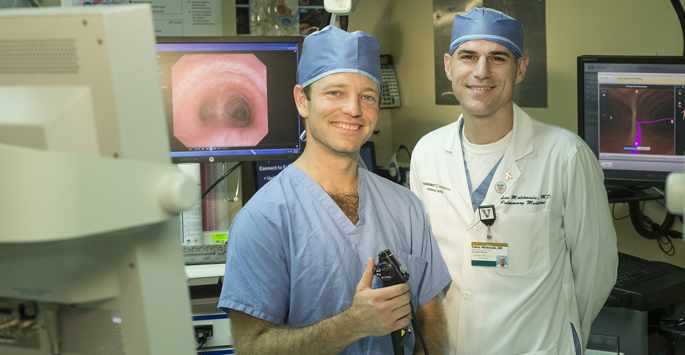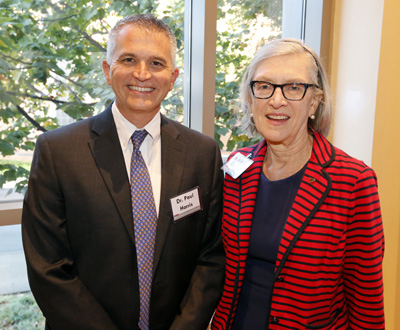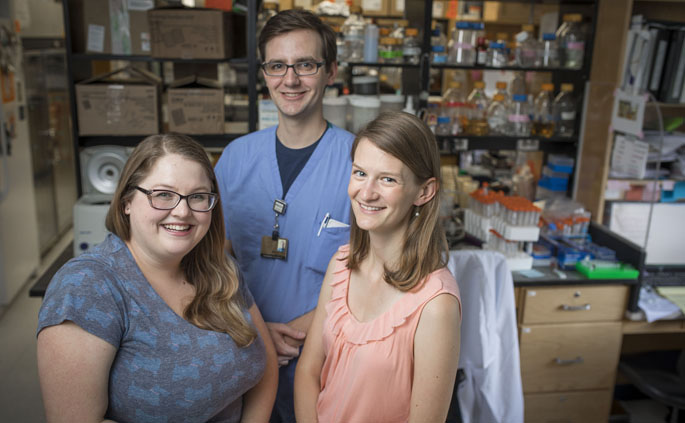Health And Medicine
-

Vanderbilt leads international effort to develop universal flu vaccine
Researchers at Vanderbilt University Medical Center are leading an international effort to develop a universal influenza vaccine that would protect everyone against all strains of the flu anywhere in the world. Read MoreOct 26, 2017
-

Study seeks new ways to detect sensory issues in TBI patients
Vanderbilt researcher Tonia Rex, Ph.D., is accustomed to performing studies in her lab with a goal of translating the findings into better diagnoses and treatment tools for the visually impaired. Read MoreOct 26, 2017
-

Team to develop steerable robotic needle for biopsies
Collaboration between a mechanical engineer at Vanderbilt University and a pulmonologist at Vanderbilt University Medical Center (VUMC) has resulted in a National Institutes of Health (NIH) R01 grant that will be used to develop a steerable robotic needle to safely biopsy hard-to-reach lung nodules. Read MoreOct 26, 2017
-

Study to test combination therapy for breast cancer
Vanderbilt-Ingram Cancer Center (VICC) has received $2.3 million to fund a clinical research trial testing a combination of three immunotherapy compounds for patients with a specific type of advanced breast cancer. Read MoreOct 26, 2017
-

Forum highlights strong clinical, translational research efforts
Clinical and translational research at Vanderbilt University Medical Center (VUMC) is thriving. Read MoreOct 19, 2017
-

Calcium intake and colorectal cancer
Calcium intake appears to protect against colorectal cancer in individuals with certain gene variants, Vanderbilt researchers have discovered. Read MoreOct 18, 2017
-

Gender, pain and dementia
Understanding sex differences in pain perception could lead to more targeted and effective pain assessment and management strategies in older adults with Alzheimer’s disease. Read MoreOct 16, 2017
-

New tools to combat kidney fibrosis
Vanderbilt investigators have developed a new mouse model of kidney fibrosis, which provides a platform for identifying new targets and treatment strategies. Read MoreOct 13, 2017
-

A switch for autoimmunity
Vanderbilt investigators have discovered a class of compounds that inhibit a mediator of inflammation and autoimmune disorders, and that could pave the way for development of future therapies. Read MoreOct 12, 2017
-

Researcher targets peanut allergies with Cohen Fund support
Scott Smith, M.D., Ph.D., assistant professor of Medicine, has received a 2017 research award from the Stanley Cohen Innovation Fund to test a new therapeutic strategy for peanut allergies. Smith's research could fundamentally change allergy treatment. Read MoreOct 12, 2017
-

VIGH receives federal grants to fight kidney disease
Researchers in the Vanderbilt Institute for Global Health (VIGH) have received two new grants from the National Institutes of Health (NIH) aimed at reducing the risk of kidney disease in HIV-infected adults and improving the treatment of epilepsy in children in Nigeria. Read MoreOct 12, 2017
-

Major international study testing therapy to prevent spread of HIV
Nine more volunteers are needed to complete a study at Vanderbilt University Medical Center (VUMC) that could lead to a way to prevent the spread of HIV (human immunodeficiency virus). Read MoreOct 5, 2017
-

Mayor to speak at Center for Addiction Research science day
Nashville Mayor Megan Barry will speak during a “science day,” Tuesday, Oct. 17, at the Belcourt Theatre hosted by the Vanderbilt Center for Addiction Research (VCAR). Read MoreOct 5, 2017
-

Boosting sarcoma cell death
A compound identified at Vanderbilt represents a new lead for treating rare, aggressive childhood cancers called Ewing sarcomas. Read MoreOct 4, 2017
-

Cell signals that trigger wound healing are surprisingly complex
Vanderbilt scientists have taken an important step toward understanding the way in which injured cells trigger wound healing, an insight essential for improving treatments of all types of wounds. Read MoreOct 3, 2017
-

Delirium, benzos and the pediatric ICU
With other risk factors held equal, children who received a benzodiazepine sedative drug were nearly three times more likely to experience delirium – confused thought – the following day. Read MoreOct 2, 2017
-

Novel insights to antibiotic targets
New mechanistic details about the DNA-unwinding activity of antibacterial protein targets could lead to the design of better antibiotic medicines. Read MoreSep 29, 2017
-

Cellular calcium handling in diabetes
Potassium channels in a cellular organelle regulate calcium flux and appear to play a critical role in pancreatic beta cell health. Read MoreSep 28, 2017
-

VICC investigators land support from Komen Foundation
Three breast cancer investigators from Vanderbilt-Ingram Cancer Center (VICC) have been awarded research grants from Susan G. Komen, a nonprofit foundation devoted to supporting cancer research, community health outreach, advocacy and public policy initiatives. Read MoreSep 28, 2017
-

Excess dietary manganese increases risk of staph infection in heart
Too much dietary manganese — an essential trace mineral found in leafy green vegetables, fruits and nuts — promotes infection of the heart by the bacterium Staphylococcus aureus (“staph”). Read MoreSep 21, 2017